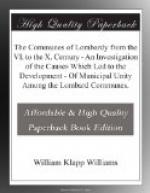In the following pages I will try to sift the evidence obtainable, with the impartiality of one trammeled by the support of no particular theory; always bearing in mind, however, one fact, all-important in a study where so much depends on nomenclature, namely, to give that shade of meaning and that amount of weight to any term which it possessed in the age in which it was used, carefully distinguishing this from its use in any earlier or later age. The importance of this caution will be soon seen when we come to discuss the origin of corporate life in the communes, where many have been misled by attaching to the words respublica and civitas, for example, so continually recurring in the old laws and charters, a meaning which was entirely foreign to the terms at the period of their use. With this warning, we will turn to a consideration of the first effects of the inroad of the northern barbarians on the cities, whose exhausted and defenseless state has already been pointed out.
One of the chief characteristics of the Teutonic tribes which overran Italy during the fifth and sixth centuries, was an innate hatred of cities, of enclosing walls and crowded habitations. Children of the field and the forest, they had their village communities and their hundreds, their common land and their allotted land, but these were small restrictions on their free life, and left an extended “air-space” for each individual and his immediate household. Homestead was not too near homestead, each man being separated from his neighbor by the extent of half the land belonging to each. The centralization of population in city life was a thing undreamed of, and an idea abhorred, alike for its novelty and for the violence it did to the as yet untrained instincts of the people. The strong, independent individualism of the Teutonic freeman rebelled against anything which would in any way limit his freedom of action: “ne pati quidem inter se junctas sedes,” says Tacitus.[3] An agriculturist in his rude way, he lived on the land which supported him and his family, and feeling no further need, his untrained intelligence could form no conception of the necessities and the advantages of the social union and interdependence of a more civilized state of society; nor could he comprehend the mutual relations of the individual to the immediate community in which he lived.
He could understand his own relation to and dependence on the state as a whole; alone he could not repel the attacks of neighboring tribes, alone he could not go forth to conquer new lands or increase the number of his herds. But why he should associate with others and so limit the freedom which was his birthright, for other purposes than those of attack and defense, of electing a leader for war, or getting his allotment of land in peace, was altogether beyond the horizon of his comprehension. He was sufficient unto himself for all the purposes of his daily life; to the product of his own plough and hunting-spear




